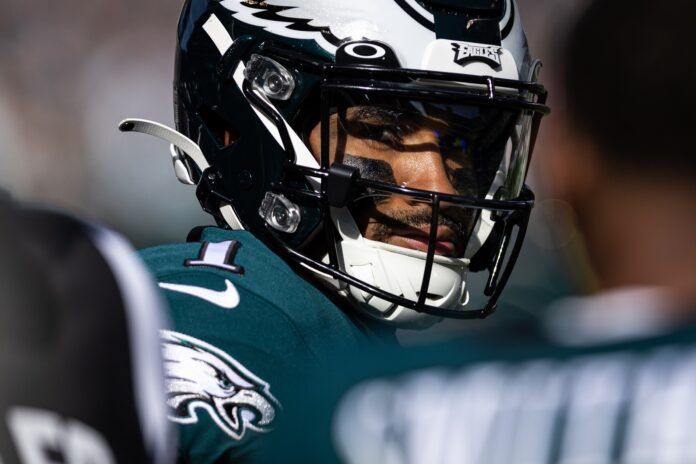Jalen Hurts is a polarizing player; there’s no denying that. As he’s led the Philadelphia Eagles as the NFL’s last undefeated team, the question of why he fell in the 2020 NFL Draft has come to the front of everyone’s mind.
Why Jalen Hurts Was Drafted 53rd Overall in 2020
Before answering that question, it’s important to level set. The Eagles had Carson Wentz on their roster and were entering the 2020 season as reigning NFC East Champions. They were 9-7 the year prior, but Doug Pederson had failed to capture the magic that was their 2017 Super Bowl Championship.
Philadelphia owned the 21st pick of the first round and the top of quarterback class was surely set to be off the board by then. As such, Joe Burrow, Tua Tagovailoa, and Justin Herbert were all selected within the first six picks, leaving the remaining quarterbacks to fall or have a team pluck at the tail end of Round 1.
Jordan Love was selected following Philadelphia’s pick of Jalen Reagor, making him the fourth and final quarterback of the first round.
It was clear that no team valued Hurts in the first round. He slid out of the first 32 selections and ultimately landed as the fifth quarterback, selected to Philadelphia at No. 53 overall. There were certainly concerns over Hurts’ scheme-dependent success, lack of accuracy, and his low point at Alabama, where he was benched in favor of Tagovailoa. But were they valid?
Pro Football Network’s Ian Cummings discusses why Hurts fell to 53 in the 2020 NFL Draft.
Ian Cummings: I think it was a perfect storm of several factors that led to Jalen Hurts’ fall down the 2020 NFL Draft board.
No doubt, a few of the stereotypical assumptions geared toward quarterbacks played a part. He wasn’t a prototypical pocket passer by style, and his height also probably ruled him out for a few teams.
MORE: Top 10 Quarterbacks in the 2023 NFL Draft
Conceptually, Hurts’ relation to Tagovailoa at the collegiate level also may have hurt him. Tagovailoa was the QB who ultimately replaced Hurts as Alabama’s starter. It’s a surface-level argument that doesn’t get into the diagnostics, but those kinds of associations can work against prospects.
It’s also important to note that Hurts in college was not the Hurts he is today. He came into the NFL needing growth as a passer. He was an imperfect prospect — but I also think therein lies one of the flaws of Hurts’ evaluation. People fixated too much on what he was, and not enough on what he could be if an offense played to his strengths.
Now, the ultimate ceiling isn’t the only factor, either. Take Malik Willis this past cycle, for example. He had high-level creation capacity and arm talent but also had many concerning issues in the operational department.
You have to take it case by case.
In Hurts’ case, he did prove he could be an efficient producer in a strong offensive system. Hurts proved he could earn a starting job again after transferring and work through adversity. Additionally, Hurts’ elite running ability was evident on his film and stood out as a foundational element of his game that could be built upon.
Looking back, perhaps not enough focus was directed toward his ceiling.
Not every developmental QB prospect is going to work out like Hurts did. But I think Hurts’ fall is a lesson. If those prospects do pan out and reach their ceiling, it’s absolutely worth the gamble. More often than not, they need a stable system, supporting talent, and buy-in like Hurts has had.
But those are the chances you have to take and fully invest in to win in the NFL.

